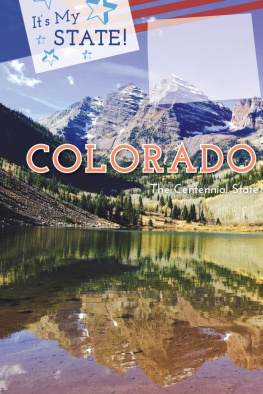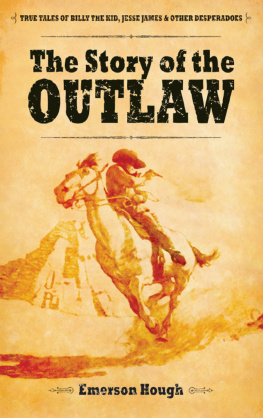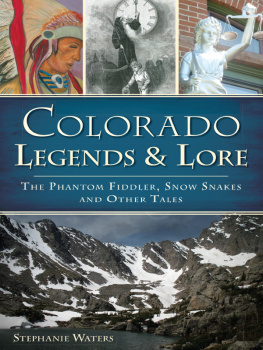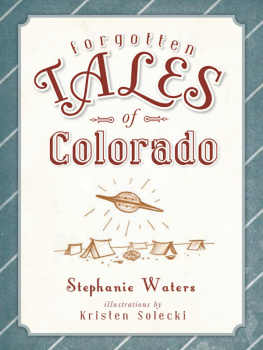To buy books in quantity for corporate use
or incentives, call (800) 962-0973
or e-mail premiums@GlobePequot.com.

Copyright 2012 by Morris Book Publishing, LLC
ALL RIGHTS RESERVED. No part of this book may be reproduced or transmitted in any form by any means, electronic or mechanical, including photocopying and recording, or by any information storage and retrieval system, except as may be expressly permitted in writing from the publisher. Requests for permission should be addressed to Globe Pequot Press, Attn: Rights and Permissions Department, PO Box 480, Guilford, CT 06437.
TwoDot is an imprint of Globe Pequot Press and a registered trademark of Morris Book Publishing, LLC.
Map Morris Book Publishing, LLC
Project editor: Lauren Brancato
Layout artist: Justin Marciano
Library of Congress Cataloging-in-Publication Data
Murphy, Jan Elizabeth.
Outlaw tales of Colorado : true stories of the centennial states most infamous crooks, culprits, and cutthroats / Jan Elizabeth Murphy. 2nd ed.
p. cm.
Includes bibliographical references and index.
ISBN 978-0-7627-7235-3
1. CrimeColoradoHistory19th century. 2. CrimeColoradoHistory20th century. 3. CriminalsColoradoHistory19th century. 4. CriminalsColoradoHistory20th century. I. Title.
HV6793.C6M87 2012
364.109788dc23
2012028501
Printed in the United States of America
10 9 8 7 6 5 4 3 2 1
Dedicated to those who were there for me without question, and who were on the front lines when I needed it most, especially my cousin Ann Morehead Wilson, my friend Darilyn Woodaman, my loving mom, Joan Pierron Murphy, and my way-shower Barb DeCaro. Also Dr. Andrew Nemechek, Dr. Steven Osa, and many more friends and relatives who were supportive from near and far. It may take a village to raise a child, but it also takes a community to love a person through distress. Every shared talent, good thought, good wish, prayer, meal, greeting card, loving ear, hug, cheering smile, caring e-mail, and taxi ride were received by me with immeasurable appreciation and gratitude. Humankind has no bounds when it gives freely. To be on the receiving end is a revelation like seeing into Gods heart. To love is a joy, and to be loved is an eternal gift. Thank you.
Also special thanks to: Jan Pond, Kathy Zornes Samsel, Jan Hadley, Rosa Mazone, Maro Lorimer, Karin Cooper, Alice Green, Hilarie Anderson, Dawn Browne, Deb Green, Julie Armour, the Books-In-Common book club, the Jefferson County Historical Society, and my editor Courtney Oppel.
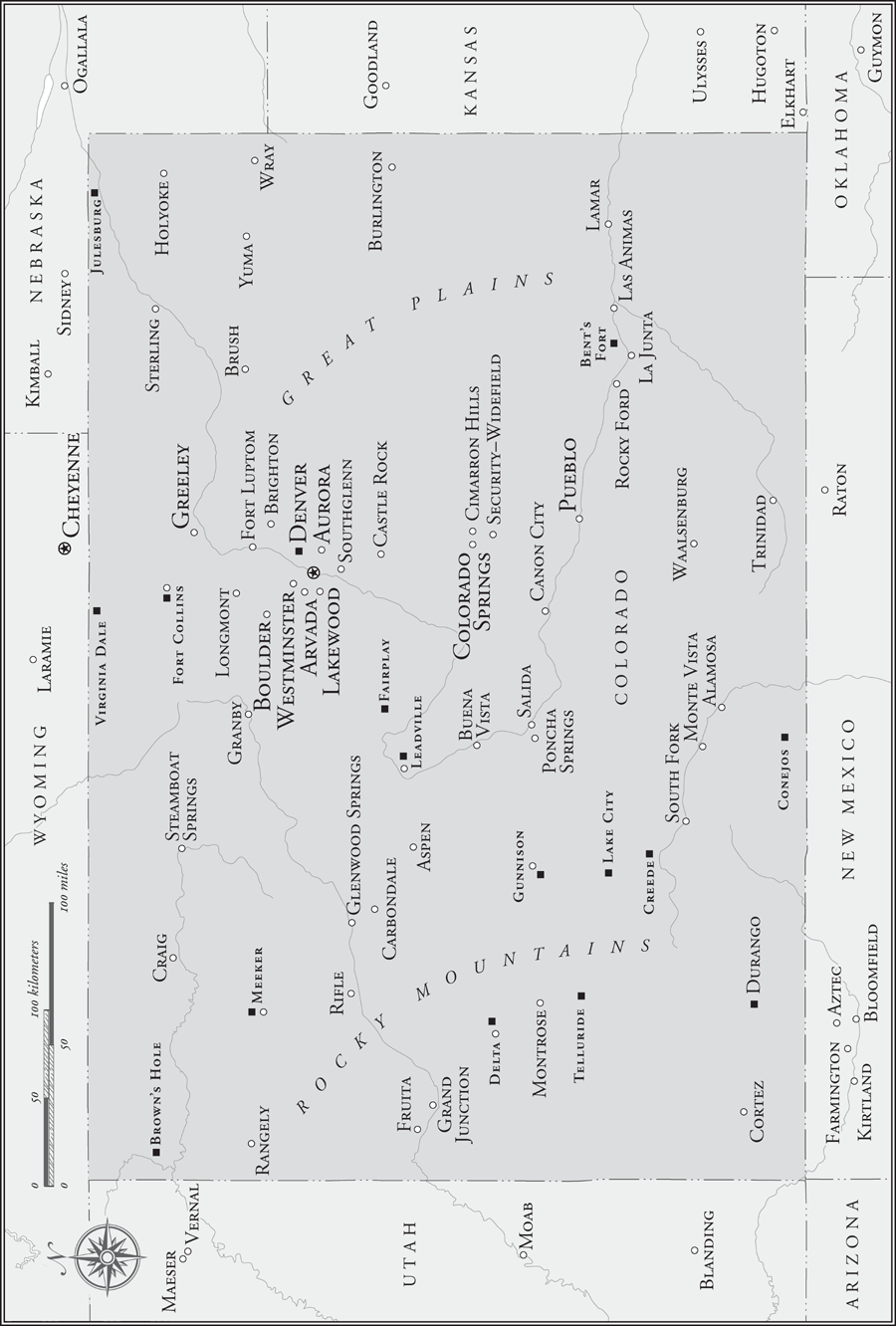
Introduction
There is no recorded history of outlaws in Colorado before the 1850s. Except for a few settlers and native tribes, no towns existed.
Colorado has one of the shorter recorded histories of the western states. Early explorers from Escalante and Domnguez to Fremont all reported this uncharted territory as having mountains that are not climbable and land that is uninhabitable, except by the savage Indians. They were referring to the Rocky Mountains, which are higher in elevation in Colorado than anywhere else along the chain. They also found virtually no lakes or streams that held any appreciable amounts of water. As the United States of America expanded, all of the trails leading to the Pacific detoured around Colorado because of the impassable mountains and lack of water. Colorado would not become a territory until 1861, or achieve statehood until 1876.
The future site of the state of Colorado remained largely ignored. The California gold rush in 1849 caused only a tiny ruffle of speculation through Colorado. In 1850, there were so few nonnative inhabitants that the main language spoken was Ute. The southernmost part of present-day Colorado had been sparsely populated in the 1700s under the flag of Mexico, whose government wanted its people to homestead the area. But the desolate land and lack of water discouraged most from settling. The name Colorado is of Spanish derivation and means the color redrepresenting the brilliant crimson hue of the soil.
Except for this small incursion, the native Indians still held forth as the primary population. Other than the predominant Utes, the other larger populations included the Cheyenne, Arapaho, Apache, and Kiowa. From 1833 to 1847 Bents Old Fort was the only nonnative outpost along the Colorado section of the Santa Fe Trail, which barely crossed into the southeastern corner of the present state.
The total region of modern Colorado sat mostly quiet and undisturbed, except for the occasional tribal skirmishes. Even the native populations were said to run only in the thousands. Buffalo likely outnumbered people. This land was not only quiet; it was very, very empty.
Then the California gold rush began to play itself out, and miners began to return from the far West to the Rocky Mountains. Gold had been found in a Colorado stream that gushed out of the mountains onto the plains, and a general excitement began to build. By 1857, a small town called Denver was chartered along one bank of Cherry Creek. Across from it, on the other bank, another town called Auraria began. Suddenly, as more gold and silver was found in them thar hills, the population swelled. Adventurers poured in from every border. Lack of water and high mountains were no longer the formidable impediments they had once been considered. For riches, almost anything could be overcome. The gold diggers and silver miners who were rushing into this veritable vacuum were called the 59ers.
With this influx of fortune seekers, there were others who wanted to profit from their newfound wealth, and not always legitimately. Like parasites, some came to trick, rob, cheat, and steal from the hordes of men (and a few women) who had little bags of gold dust and silver nuggets stashed in their pockets (or in their petticoats). Others stole horses and cattle, money and jewels, and robbed banks, sometimes killing their victims.
Now, Colorado had outlaws.
Jack Slade
Gunslinger
There was such magic in that name, SLADE! wrote author Mark Twain in his book Roughing It, an autobiographical account of his visit to the West as a young man.
While traveling toward the Rocky Mountains, Twain had been hearing about a certain man named Jack Slade. He was said to be a gunslinger, a killer who was feared by all. The conductors talked about Slade on the train, and the stories only grew more outrageous after the rails ended and Twain continued on by stagecoach.
Soon, Twain was so mesmerized by these tales that he wanted to hear about nothing else. What a land the West must be to have men like Slade roaming loose across the countryside. Twains fertile imagination could only speculate as to what this man must be like.
Nearing Julesburg, in present-day Colorado, the stage passengers were hungry after traveling all night. They looked forward to giving their knotted muscles a rest from the bumpy and uncomfortable ride, and when the stage rattled on to the next station, they poured into the little building. Twain sat down to breakfast at a table with the other passengers. Some Central Overland Company stagecoach officers, who were already there, joined the group. Twain was seated next to the superintendent, who was at the head of the table. He was a gentlemanly and mannerly fellow who was dressed better than the rest.


